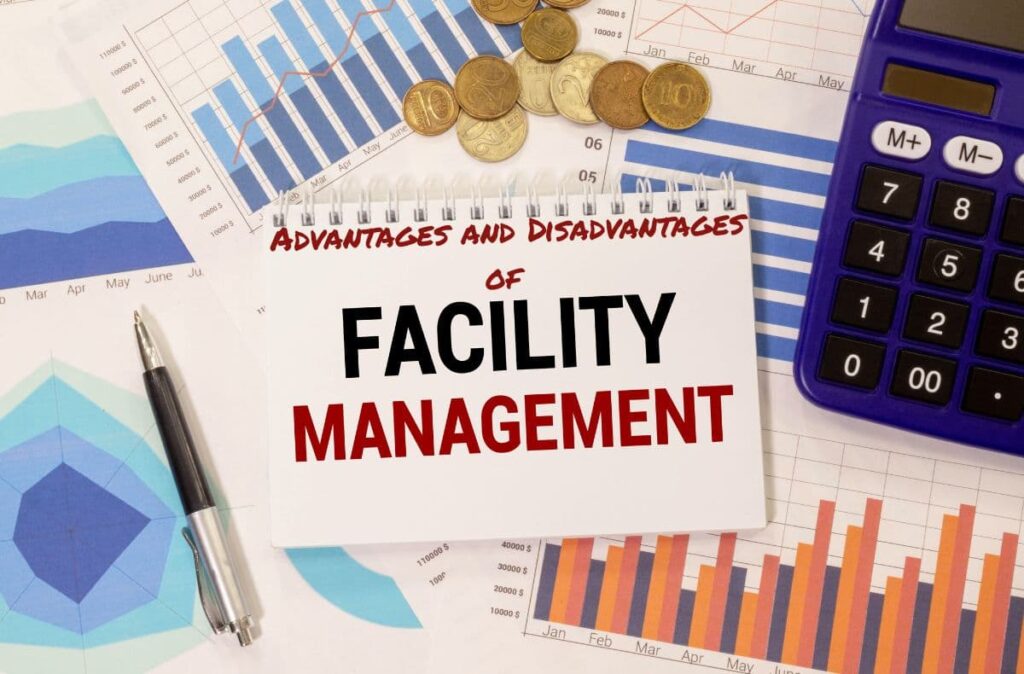Facility Management (FM) is often hailed as a game-changer for property performance, but like any business strategy, it has both benefits and limitations. Understanding the advantages and disadvantages of facility management will help you make an informed decision about whether to manage facilities in-house, outsource to a professional provider, or use a hybrid approach.
Whether you’re a Body Corporate Manager balancing committee budgets across multiple complexes, or an investor optimising returns on a nationwide portfolio, this guide explores the value FM can bring, and the potential facility management drawbacks to be aware of.
Table of Contents
What Is Facility Management? (Quick Overview)

According to Wikipedia, Facility Management is “a professional management discipline focused on the efficient and effective delivery of logistics and other support services related to real property.” In simpler terms, it’s about making sure your building or portfolio runs smoothly, safely, and cost-effectively.
FM covers two major categories:
- Hard Services: Maintenance of physical assets such as HVAC systems, lifts, roofing, plumbing, electrical, fire safety, and other infrastructure.
- Soft Services: Cleaning, security, waste management, landscaping, space planning, and front-of-house services.
Many organisations turn to the International Facility Management Association (IFMA) for guidance, benchmarking, and training, demonstrating the level of specialisation and professionalism involved in this field.
Read more: What is Facilities Management, and Why is it Essential?
Key Advantages of Facility Management
When executed well, FM can transform the way a building or portfolio performs – financially, operationally, and environmentally. Here are the major benefits:
1. Improved Asset Lifecycle & Reduced Costs
A core goal of FM is to extend the useful life of building systems and equipment. Preventative maintenance reduces the likelihood of costly breakdowns. According to IFMA’s Operations and Maintenance Benchmarks, proactive maintenance can reduce total maintenance costs by up to 18% compared with reactive models.
2. Compliance & Risk Management
Facilities Managers stay on top of health and safety regulations, building code compliance, and insurance requirements, which are critical for reducing liability. This is especially important for Body Corporate Managers, whose committees expect buildings to remain fully compliant with the Unit Titles Act and Health & Safety at Work Act.

3. Operational Efficiency
Professional FM introduces consistent systems, digital platforms, and performance reporting. For property investors, this means a single source of truth for their portfolios, helping them to make faster, data-backed decisions.
Read more: Technology Trends Transforming Facilities Management in 2025
4. Sustainability & ESG Goals
Modern FM supports energy efficiency, waste reduction, and sustainability initiatives. This directly impacts quality of life for residents and tenants while also contributing to lower carbon footprints – an increasingly important metric for investors.
5. Enhanced Tenant & Resident Experience
Happy occupants mean lower turnover and fewer complaints. FM improves building comfort, cleanliness, and responsiveness, boosting reputation and ultimately property value.
Key Disadvantages of Facility Management
Despite the many benefits, there are facility management drawbacks that organisations should consider before committing to a strategy.
1. Upfront Investment
Professional FM services, digital platforms, and comprehensive audits often require upfront investment. For smaller body corporates with limited budgets, this can be a barrier.
2. Dependency on Provider Quality
If FM is outsourced, performance depends heavily on the quality of the chosen provider. A poorly managed contract can result in delayed maintenance, compliance issues, or lack of transparency, eroding trust with committees and stakeholders.
Read more: Key Components of Effective Facilities Management
3. Cultural Resistance to Change
Some committees or senior decision-makers may resist moving from a reactive approach to a structured, planned maintenance model. This can slow implementation and reduce ROI.

4. Complexity of Transition
Migrating from an ad hoc or fragmented system to a centralised FM platform can be complex, requiring data gathering, vendor realignment, and training.
5. Ongoing Costs
While FM typically pays for itself over time, there are ongoing costs to maintain systems, audits, and reporting. Budgeting for these costs is critical to avoid underfunding.
Read more: How to Select the Best Facilities Management Partner in NZ
Common Facility Management Challenges (and How to Overcome Them)
Even with a robust FM strategy, there are real-world challenges you may face. Addressing these upfront can make the difference between success and frustration.
- Data Fragmentation: Many property managers struggle to collect and centralise asset data. Solution: Use FM software with real-time dashboards for easier portfolio oversight.
- Vendor Coordination: Managing multiple contractors can lead to communication breakdowns. Solution: Appoint a single FM lead or service provider to coordinate vendors.
- Reactive Culture: Shifting from a “fix-it-when-it-breaks” mindset to preventative planning requires education and committee buy-in. Solution: Present lifecycle cost savings and case studies to justify investment.
- Budget Constraints: FM can be underfunded if not clearly linked to ROI. Solution: Build transparent, evidence-based business cases showing reduced total cost of ownership.
Read more: What Do Facilities Managers Do? Key Responsibilities Explained
Conclusion: Making Facility Management Work for You
Facility Management is a powerful tool for maximising asset value, reducing risk, and enhancing the experience for occupants. However, it’s not without its challenges – upfront investment, cultural change, and dependency on quality providers must be considered.
For Body Corporate Managers, effective FM means fewer emergency callouts, happier residents, and clearer reporting to committees. For property Investors, it’s the key to unlocking scalability and performance across a national portfolio.
The most successful organisations approach FM as a strategic partnership, not just an operational expense. With the right provider, the advantages far outweigh the drawbacks, setting your assets up for long-term success.
Learn more about how we deliver value through Facilities and Asset Management.
Frequently Asked Questions
What happens if facility management is underfunded?
When FM is underfunded, maintenance becomes reactive instead of proactive, leading to higher long-term costs, increased equipment failures, compliance risks, and unhappy occupants. Underinvestment is one of the most common causes of premature asset failure.
Does facility management require specialised expertise?
Yes. Facility Management is a professional discipline requiring expertise in property management, compliance, building systems, and risk mitigation. Many FMs hold industry certifications through IFMA or other associations.
Read more: The Benefits of Outsourcing Facilities Management
Is facility management expensive to implement?
While there are upfront costs, FM often saves money over time by reducing emergency repairs, improving energy efficiency, and extending asset lifespans. The ROI is typically realised within 1–3 years for most organisations.
